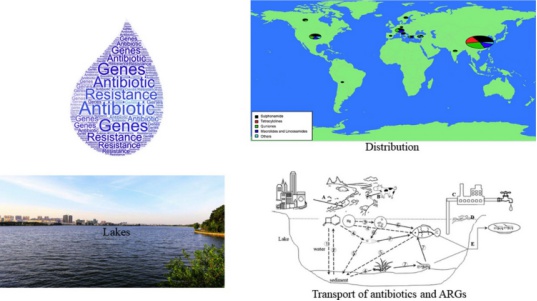Name:YANG Yuyi
Tell:
Email:ytyang@dundee.ac.uk
Organization: Wuhan Botanical Garden
Researchers Uncover the Antibiotics and Antibiotic Resistance Genes in Global Lakes
2018-05-04
In 1928, the discovery of penicillin opened the modern era of antibiotic innovation and development. Nowadays, antibiotics are used as medicine for humans, but also widely used in animal husbandry and aquaculture. However, antibiotics, unintentionally discharged into the environment, pose a great threat to ecosystems and human health. Aquatic environments become major pools for antibiotics and antibiotic resistance genes (ARGs). Until now, no comprehensive review of antibiotics and ARGs in lakes has been conducted.
Dr.YANG Yuyi, Prof. XING Wei from Wuhan Botanical Garden, Dr. SONG Wenjuan from Xinjiang Institute of Ecology and Geography, and Dr. LIN Hui from Zhejiang Academy of Agricultural Sciences and other researchers worked together to collate the occurrence, distribution and risk of antibiotics and ARGs in global lakes.
The meta-analysis showed that seven antibiotics (sulfamethoxazole, sulfamerazine, sulfameter, tetracycline, oxytetracycline, erythromycin, and roxithromycin) were found at high concentrations in both lake water and lake sediment.
No significant difference in sulfonamides concentration, but a significant difference in quinolones was found in lake water from China and that from other countries worldwide. Erythromycin had the lowest predicted hazardous concentration for five percent of the species (HC5) and the highest ecological risk in lakes. There was no significant difference in the concentration of sulfonamide resistance genes (sul1 and sul2) in lake water and river water.
Unfortunately, the continuous discharge of chemical pollutants into lakes will not be readily solved in the near future, and selection pressure on ARGs in lakes will continue. It is urgent to develop priority lists of antibiotics and their metabolites in lakes; identify some of the key pollutants influencing ARG propagation for proper lake management; identify the persistence of ARGs in the environment and their resistance to conventional drinking water treatment methods; understand the long-term ARG propagation exerted by individual or combined pollutants at environmental concentrations; and understand the role of aquatic biota in the transport of antibiotics and ARG propagation.
This project was supported in part by National Natural Science Foundation of China and Youth Innovation Promotion Association of Chinese Academy of Sciences. The review was published in Environment International entitled "Antibiotics and antibiotic resistance genes in global lakes: A review and meta-analysis”.

The distribution and transport of antibiotic and antibiotic resistance genes in global lakes (Image by YANG Yuyi)